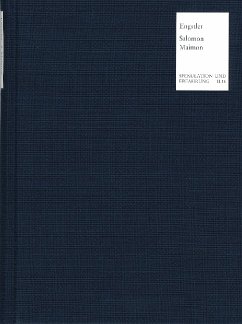Nicht lieferbar

Untersuchungen zum Idealismus Salomon Maimons
Versandkostenfrei!
Nicht lieferbar
In the context of his critique of the Kantian concept of the thing-in-itself, Maimon (1753-1800) was the first of the post-Kantian philosophers to get serious about the idealist point of view. Maimon's writings on this subject are however extremely dark. By analyzing the texts very precisely, Engstler succeeds in bringing more light into this darkness.Maimon (1753-1800) macht im Kontext seiner Kritik des kantischen Ding-an-sich-Begriffs als erster der nachkantischen Philosophen Ernst mit dem idealistischen Standpunkt. Aber Maimons einschlägige Schriften sind äußerst dunkel. Mit sehr genauen...
In the context of his critique of the Kantian concept of the thing-in-itself, Maimon (1753-1800) was the first of the post-Kantian philosophers to get serious about the idealist point of view. Maimon's writings on this subject are however extremely dark. By analyzing the texts very precisely, Engstler succeeds in bringing more light into this darkness.Maimon (1753-1800) macht im Kontext seiner Kritik des kantischen Ding-an-sich-Begriffs als erster der nachkantischen Philosophen Ernst mit dem idealistischen Standpunkt. Aber Maimons einschlägige Schriften sind äußerst dunkel. Mit sehr genauen Textanalysen gelingt es Engstler, mehr Licht in dieses Dunkel zu bringen.




